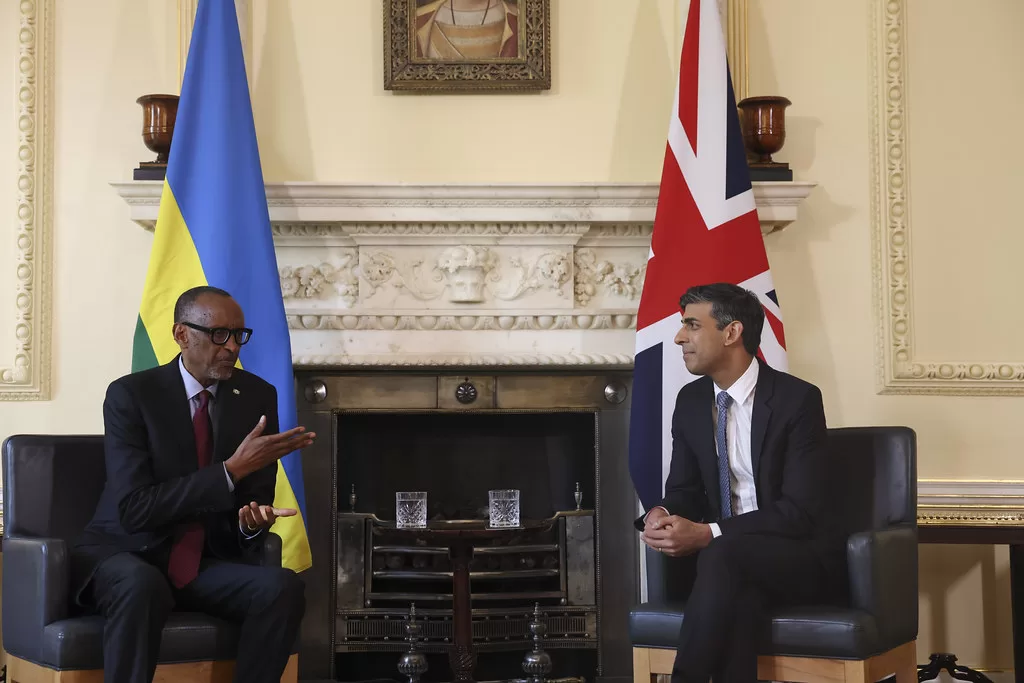After the infamous “go home” vans, the Windrush scandal and a (failed) policy to push back people crossing the channel on boats, this week the UK government sharpened its latest tool in its hostile environment box: the Rwanda plan. UK Prime Minister Rishi Sunak threw a surprise press conference about the government’s Rwanda policy, now freshly emboldened with a new treaty following the Supreme Court’s declaration that Rwanda is not a safe country for UK asylum seekers. The prime minister said he would “finish the job” of getting his controversial deportation plan off the ground.
Questions from journalists to Sunak centred largely around what a vote on new legislation means for the state of the Conservative Party and Sunak’s position as leader. There are free speech implications here too and so I’d like to add a few questions to the list: how does the Rwanda plan impact people at risk? How will the UK keep safe persecuted people? And how will we make sure that people who have a legal right to seek asylum have a voice?
Of the latter, last summer, the BBC aired Sir Mo Farah’s documentary on his experience of being trafficked to the UK from Somaliland as a child, and how he was forced to work as a domestic servant. He was told, “If you ever want to see your family again, don’t say anything. If you say anything, they will take you away.”
His real name is Hussein Abdi Kahin. He was eventually helped in his claim for British citizenship through what was technically fraudulent means and, until the documentary aired, he had remained silent about his true identity, about what he had experienced as a child and really about everything that had weighed on his mind. He feared speaking up and so he stayed silent.
As a much-loved public figure, perhaps Farah knew he would have some modicum of protection if he revealed the truth, which it turns out he did. For others who are victims of trafficking, asking for help can be another story. The only option of escaping exploitation might be going to the authorities and seeking asylum, but this is not the most appealing, or even easy, route. Aberystwyth University’s Gillian McFayden described the Home Office’s “culture of disbelief” in 2018, and how in interviews “inconsistencies will be held against the asylum seeker and they will then be viewed as lacking in credibility.” Trauma is difficult to recount in a consistent way – and this is effectively used against people.
When I last visited Calais and spoke to people planning to cross to the UK (and where they frequently reported violence from French police), there was also a severe lack of clear information about what life in the UK would be like and how the system works. Rumours abounded, amid patchy access to data and language barriers. With a landscape ripe for misinformation and policies that are already unclear amongst the UK public, the confusion that comes from a complicated and hostile environment only leaves people making the journey to the UK more susceptible to exploitation.
Then there is Rwanda itself, hardly known for its robust human rights record. Sile Reynolds, head of asylum advocacy at Freedom from Torture, told me today: “We know from our own clients – survivors of torture who’ve fled the most unimaginable horrors and encountered further trauma on their journeys to find safety – the awful toll that this policy has taken on them. Clinicians have reported that some of our clients are so terrified of being shipped off thousands of miles away to Rwanda that they’d contemplate committing suicide if they were ever served with a removal notice. The stakes really could not be any higher.”
On Rwanda, let’s pause for a moment on its rights record. There is widespread evidence of the abuse of LGBTQ+ people, as just one example. Grassroots asylum support charity African Rainbow Family launched a petition earlier this year to stop the deportation of LGBTQ+ people to the country. On a poster for their No Pride in Deportation campaign, they wrote, “One of our service users was just granted her freedom by the Home Office. She was forced to flee her home in Rwanda due to the persecution she faced as an LGBTIQ+ person. Even the Home Office recognises that Rwanda is unsafe for LGBTIQ+ people.”
They said of LGBTQ+ people: “Deporting them back to these hostile environments can risk condemning them to continued suffering, exile, physical harm, emotional trauma, abuse, isolation, torture and death.”
On the UK government’s own foreign travel advice page for Rwanda it says: “LGBT individuals can experience discrimination and abuse, including from local authorities.” Should we be sending people to a country where they can’t freely express their identity, where doing so could even lead to death?
With the strengthening of the hostile environment comes the lack of something else: safe routes. It’s not just people already in the UK being impacted by this asylum policy, but persecuted people looking to the UK for help. Take the Afghan journalists we work with who fled to Pakistan only to find more danger awaiting them, and little opportunity to earn a living. Some told us they had considered selling a kidney to afford food, which, horrifyingly, others have indeed done. And after Pakistan forced Afghan refugees to leave at the beginning of November, the situation may have become even more dangerous. Women in Afghanistan have no voice. There is no room for dissent or criticism.
Thankfully, some of the Afghan journalists we work with have found sanctuary in France, after the UK failed to make good on promises of refuge. There are still many more Afghans at risk who should be offered safety in the UK, but instead the focus is on deterrents over safe routes and compassion.
Reynolds accused the government of the “demonisation and scapegoating of refugees” and called policies like the Rwanda scheme and Bibby Stockholm “performative cruelty.” For people seeking refuge in this environment, fear breeds silence. For persecuted people who are still looking for safe routes, there are few options left but more danger.






